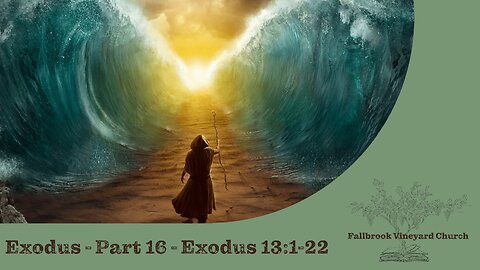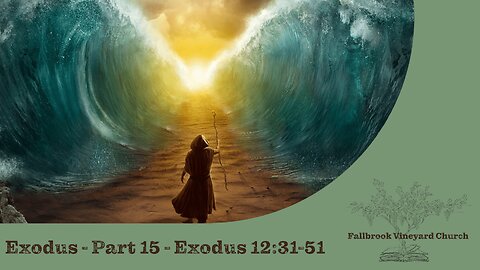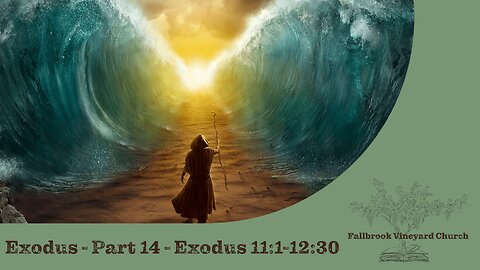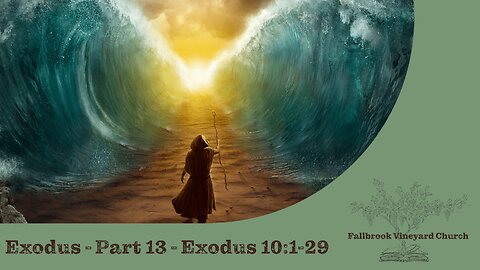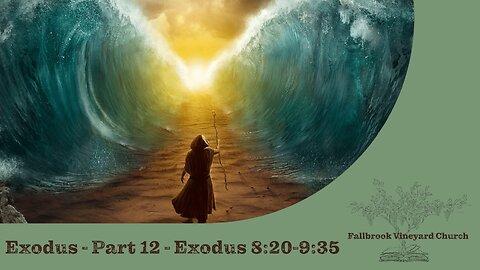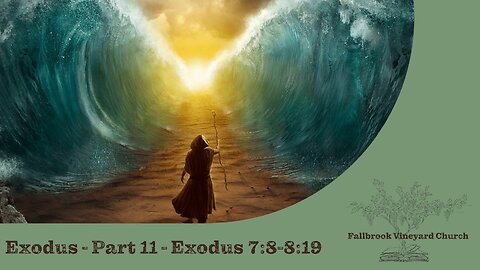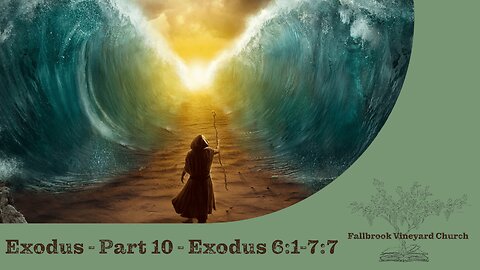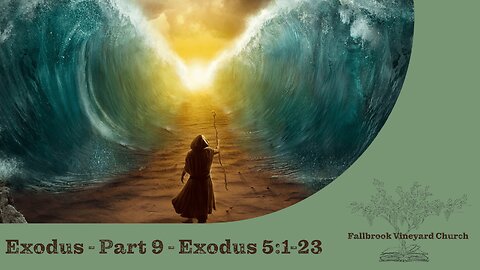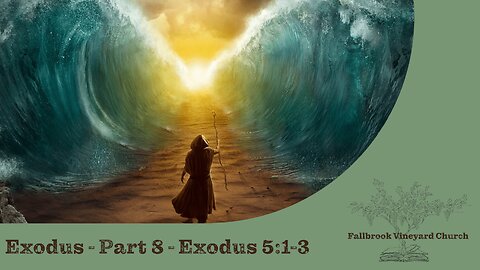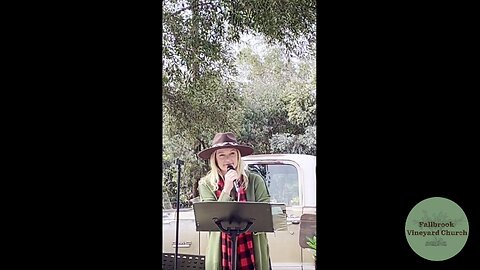
Exodus
17 videos
Updated 9 days ago
We go verse by verse through the book of Exodus.
-
You Can Ignore God All You Want
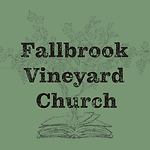 Fallbrook Vineyard ChurchWatch the full video: https://rumble.com/v65a31v-exodus-part-14-exodus-111-1230.html8 views
Fallbrook Vineyard ChurchWatch the full video: https://rumble.com/v65a31v-exodus-part-14-exodus-111-1230.html8 views -
Exodus - Part 16 - Exodus 13:1-22
 Fallbrook Vineyard ChurchExodus 13 is one of those chapters in between major events in Exodus. Nevertheless, nothing in God’s Word is put where it is by accident and this chapter is no accident. The Israelites are continuing their journey out of Egypt. As they go, God commands Moses to consecrate every firstborn, human or animal, because they belong to God. Consecration is and was an act of setting apart and removing any contamination that would interfere with a relationship with a perfect God. By consecrating the firstborn, the Israelites were pledging the entire nation to God. It would also remind them of the Passover, where God sent the Plague of Death that killed all the firstborn of Egypt, but all the firstborn of the Israelites were spared. Through Moses, God institutes the Feast of Unleavened Bread. Once the Israelites reached the land that God promised to Abraham, they were to celebrate this feast every year. It was to remind the Israelites how they were rescued by God and had to leave Egypt in haste. Leaven or yeast is also a picture of sin seen throughout the Bible. A little leaven added to bread spreads quickly throughout the dough, causing it to rise. A little bit of sin quickly corrupts our lives and our relationship to God. Then God gives some further instructions regarding the law of the firstborn. Every firstborn belonged to the Lord. Among the animals, donkeys were unclean, so they needed to be substituted with a lamb. Otherwise, the animal would have to be killed. Firstborn children were also to be redeemed with treasure or money. All this was to be done so that the Israelites throughout their generations would tell the story of how God killed all the firstborn of the Egyptians and rescued them. God wanted them to always remember this event in their history. Unlike the first section of this chapter, this section is about redemption. It is the act of saving someone from sin or captivity by making a substitution or paying a price. God then led the Israelites to their next destination out of Egypt from Succoth to Etham which was on the edge of the wilderness around the Red Sea. The shortest route to their destination was through the land of the Philistines. God knew that if they went that way, the Israelites would encounter both Philistine and Egyptian armies and likely turn around and go back to Egypt rather than fight. So, God led them by a pillar of cloud by day and a pillar of fire by night and took them to the Red Sea. All this lays out a roadmap for our relationship with God today. We have to choose to set ourselves apart or be consecrated. We have to remove the leaven, or sin from our lives. We have to be redeemed by the blood of The Lamb, who is Jesus Christ. And, we should never forget what God has done for us through Christ. We should remind ourselves daily. We also need to follow God’s direction for our lives. God sometimes takes us the longer way around to reach the destination He has for us, and we tend to not like that. But God ultimately knows what trouble lies on the route that looks shorter and easier to us. When we choose to follow God’s path instead of our own, that takes faith and leads to a deeper relationship with God.10 views 1 comment
Fallbrook Vineyard ChurchExodus 13 is one of those chapters in between major events in Exodus. Nevertheless, nothing in God’s Word is put where it is by accident and this chapter is no accident. The Israelites are continuing their journey out of Egypt. As they go, God commands Moses to consecrate every firstborn, human or animal, because they belong to God. Consecration is and was an act of setting apart and removing any contamination that would interfere with a relationship with a perfect God. By consecrating the firstborn, the Israelites were pledging the entire nation to God. It would also remind them of the Passover, where God sent the Plague of Death that killed all the firstborn of Egypt, but all the firstborn of the Israelites were spared. Through Moses, God institutes the Feast of Unleavened Bread. Once the Israelites reached the land that God promised to Abraham, they were to celebrate this feast every year. It was to remind the Israelites how they were rescued by God and had to leave Egypt in haste. Leaven or yeast is also a picture of sin seen throughout the Bible. A little leaven added to bread spreads quickly throughout the dough, causing it to rise. A little bit of sin quickly corrupts our lives and our relationship to God. Then God gives some further instructions regarding the law of the firstborn. Every firstborn belonged to the Lord. Among the animals, donkeys were unclean, so they needed to be substituted with a lamb. Otherwise, the animal would have to be killed. Firstborn children were also to be redeemed with treasure or money. All this was to be done so that the Israelites throughout their generations would tell the story of how God killed all the firstborn of the Egyptians and rescued them. God wanted them to always remember this event in their history. Unlike the first section of this chapter, this section is about redemption. It is the act of saving someone from sin or captivity by making a substitution or paying a price. God then led the Israelites to their next destination out of Egypt from Succoth to Etham which was on the edge of the wilderness around the Red Sea. The shortest route to their destination was through the land of the Philistines. God knew that if they went that way, the Israelites would encounter both Philistine and Egyptian armies and likely turn around and go back to Egypt rather than fight. So, God led them by a pillar of cloud by day and a pillar of fire by night and took them to the Red Sea. All this lays out a roadmap for our relationship with God today. We have to choose to set ourselves apart or be consecrated. We have to remove the leaven, or sin from our lives. We have to be redeemed by the blood of The Lamb, who is Jesus Christ. And, we should never forget what God has done for us through Christ. We should remind ourselves daily. We also need to follow God’s direction for our lives. God sometimes takes us the longer way around to reach the destination He has for us, and we tend to not like that. But God ultimately knows what trouble lies on the route that looks shorter and easier to us. When we choose to follow God’s path instead of our own, that takes faith and leads to a deeper relationship with God.10 views 1 comment -
Exodus - Part 15 - Exodus 12:31-51
 Fallbrook Vineyard ChurchThe plagues are over and Pharaoh and the Egyptian people have had enough! Pharaoh ordered Moses and the Israelites to leave Egypt with everything they had. Moses had instructed the Israelites to ask for articles of gold, silver, and clothing from the Egyptians. The Egyptians gave them whatever they asked for and begged them to leave because they feared that the plagues were not done and they would all die. So the Israelites plundered the Egyptians and then they began their journey out of the land. They went from Ramses to Succoth, which means Place of Tents. It was likely just a waypoint for travelers, but it allowed the Israelites to stop and bake their bread and prepare for the journey ahead of them. Many non-Israelites went with them, perhaps to escape Pharaoh’s rule. Or perhaps they were impressed by God’s display of power and wanted to follow Him. The Israelites were in Egypt for exactly 430 years. The Passover that the Israelites celebrate today marks that night, which is to be a night of solemn remembrance. God instructed Moses and Aaron that the Passover was for the Israelites and no foreigner could eat it unless they chose to make a covenant with God and were circumcised. That was the physical mark of the covenant between God and Abraham in Genesis.4 views
Fallbrook Vineyard ChurchThe plagues are over and Pharaoh and the Egyptian people have had enough! Pharaoh ordered Moses and the Israelites to leave Egypt with everything they had. Moses had instructed the Israelites to ask for articles of gold, silver, and clothing from the Egyptians. The Egyptians gave them whatever they asked for and begged them to leave because they feared that the plagues were not done and they would all die. So the Israelites plundered the Egyptians and then they began their journey out of the land. They went from Ramses to Succoth, which means Place of Tents. It was likely just a waypoint for travelers, but it allowed the Israelites to stop and bake their bread and prepare for the journey ahead of them. Many non-Israelites went with them, perhaps to escape Pharaoh’s rule. Or perhaps they were impressed by God’s display of power and wanted to follow Him. The Israelites were in Egypt for exactly 430 years. The Passover that the Israelites celebrate today marks that night, which is to be a night of solemn remembrance. God instructed Moses and Aaron that the Passover was for the Israelites and no foreigner could eat it unless they chose to make a covenant with God and were circumcised. That was the physical mark of the covenant between God and Abraham in Genesis.4 views -
Exodus - Part 14 - Exodus 11:1-12:30
 Fallbrook Vineyard ChurchWe have reached the final plague that befalls Egypt in Exodus. The consistent theme has been that picking a fight with God is futile. You won’t win. This final plague will emphasize that point and signal to Pharaoh and all of Egypt that it is finally time to let the Israelites go. The Lord told Moses He would bring one more plague on Egypt and that afterward, Pharaoh would let them go and drive them out of the land. God instructed Moses to have the Israelites ask the Egyptians to give them silver and gold, and when they did, the Egyptians gave them whatever they asked for. The Egyptian people had a respect for Moses. Then Moses announced that all the firstborn children and animals among the Egyptians would die in one night. But no animal or child among the Israelites would die. But Pharaoh once again didn’t listen. God warned Pharaoh at the beginning that He would treat Egypt’s firstborn the same way Pharaoh had treated God’s firstborn, the Israelites. Remember, at the beginning of Exodus, Pharaoh tried to murder all the Hebrew male babies and when that didn’t work, he abused them with hard labor. Pharaoh will reap what he has sown. This last plague marked a new beginning for the Israelites. God implemented the Passover which would mark the first month of the year. On the tenth day of the month very household was to take a year old male lamb that had no defects, keep it until the fourteenth day of the month, then kill it, roast it and eat it. It was to be eaten with unleavened bread and bitter herbs. This was to be done every year in memory of what God did in Egypt. Moses instructed the Israelites to take the blood of the lamb and put it on the doorposts and lintels for their houses. When the destroying angel saw the blood, he would pass over their houses, which would protect them from the plague of death. That is a perfect picture of how the blood of Jesus, the Lamb of God, spares believers from the consequences of sin and death. So, that night all the firstborn of Egypt died, just as the Lord said it would happen. There was a great cry throughout the land because every house had someone who had died. Pharaoh could ignore God all he wanted, but he couldn’t avoid Him. Anything that he worshipped as a god, got turned into a plague. God wanted Pharaoh’s heart but Pharaoh refused to yield. This is still true today in our own lives.10 views 1 comment
Fallbrook Vineyard ChurchWe have reached the final plague that befalls Egypt in Exodus. The consistent theme has been that picking a fight with God is futile. You won’t win. This final plague will emphasize that point and signal to Pharaoh and all of Egypt that it is finally time to let the Israelites go. The Lord told Moses He would bring one more plague on Egypt and that afterward, Pharaoh would let them go and drive them out of the land. God instructed Moses to have the Israelites ask the Egyptians to give them silver and gold, and when they did, the Egyptians gave them whatever they asked for. The Egyptian people had a respect for Moses. Then Moses announced that all the firstborn children and animals among the Egyptians would die in one night. But no animal or child among the Israelites would die. But Pharaoh once again didn’t listen. God warned Pharaoh at the beginning that He would treat Egypt’s firstborn the same way Pharaoh had treated God’s firstborn, the Israelites. Remember, at the beginning of Exodus, Pharaoh tried to murder all the Hebrew male babies and when that didn’t work, he abused them with hard labor. Pharaoh will reap what he has sown. This last plague marked a new beginning for the Israelites. God implemented the Passover which would mark the first month of the year. On the tenth day of the month very household was to take a year old male lamb that had no defects, keep it until the fourteenth day of the month, then kill it, roast it and eat it. It was to be eaten with unleavened bread and bitter herbs. This was to be done every year in memory of what God did in Egypt. Moses instructed the Israelites to take the blood of the lamb and put it on the doorposts and lintels for their houses. When the destroying angel saw the blood, he would pass over their houses, which would protect them from the plague of death. That is a perfect picture of how the blood of Jesus, the Lamb of God, spares believers from the consequences of sin and death. So, that night all the firstborn of Egypt died, just as the Lord said it would happen. There was a great cry throughout the land because every house had someone who had died. Pharaoh could ignore God all he wanted, but he couldn’t avoid Him. Anything that he worshipped as a god, got turned into a plague. God wanted Pharaoh’s heart but Pharaoh refused to yield. This is still true today in our own lives.10 views 1 comment -
Exodus - Part 13 - Exodus 10:1-29
 Fallbrook Vineyard ChurchThe next plague is the plague of locusts. God once again commands Moses to tell Pharaoh to let the people go or else God will send locusts on the land. Pharaoh’s servants try to convince Pharaoh to just let them go because they can see that Egypt is destroyed. So, Pharaoh tells Moses they can go serve the Lord only if they leave all the women and children behind. God was not going to negotiate, so He sent locusts and they consumed every plant. Pharaoh admits he has sinned and asks Moses to plead with God to remove the locusts. But, as soon as they are gone, Pharaoh goes back on his word again. Pharaoh refused to humble himself and submit to God. He still considered himself to be an equal to God. He thought he could bargain with God like he bargained with another human being. Even Pharaoh’s officials could see that this strategy would end in disaster. God would continue to bring judgment on Pharaoh and the Egyptian gods to show that there were none equal to Him. Osiris was the god thought to be the protector of the crops. God sent locusts to devour all the crops which showed once again that the Egyptian gods were outmatched. God will expose and topple any false god and it is foolish to put any hope in these gods. When we see our false gods fall, it can hurt. But, when we repent, there is swift relief. Once Pharaoh repented, God removed the locusts. God sends the next plague without any warning. It is deep darkness so dark that the Egyptians can’t see anything for three days. It is described as a darkness that can be felt. Pharaoh tells Moses they can go serve the Lord but they must leave their herds behind. Moses explained that they had to take their animals with them because they needed sacrifices. Pharaoh throws Moses out of his presence telling him they will never be face to face again. Moses replied and told Pharaoh he was correct. They would never see each other again. This plague was more than just physical darkness. It was a spiritual darkness that must have been terrifying. It was the closest to Hell that the plagues have gotten so far. It was a direct strike against an Egyptian god, in this case, Ra, the sun god. Ra was considered the creator god and father of the king. God proved who the real Creator and King was, is, and always will be.5 views
Fallbrook Vineyard ChurchThe next plague is the plague of locusts. God once again commands Moses to tell Pharaoh to let the people go or else God will send locusts on the land. Pharaoh’s servants try to convince Pharaoh to just let them go because they can see that Egypt is destroyed. So, Pharaoh tells Moses they can go serve the Lord only if they leave all the women and children behind. God was not going to negotiate, so He sent locusts and they consumed every plant. Pharaoh admits he has sinned and asks Moses to plead with God to remove the locusts. But, as soon as they are gone, Pharaoh goes back on his word again. Pharaoh refused to humble himself and submit to God. He still considered himself to be an equal to God. He thought he could bargain with God like he bargained with another human being. Even Pharaoh’s officials could see that this strategy would end in disaster. God would continue to bring judgment on Pharaoh and the Egyptian gods to show that there were none equal to Him. Osiris was the god thought to be the protector of the crops. God sent locusts to devour all the crops which showed once again that the Egyptian gods were outmatched. God will expose and topple any false god and it is foolish to put any hope in these gods. When we see our false gods fall, it can hurt. But, when we repent, there is swift relief. Once Pharaoh repented, God removed the locusts. God sends the next plague without any warning. It is deep darkness so dark that the Egyptians can’t see anything for three days. It is described as a darkness that can be felt. Pharaoh tells Moses they can go serve the Lord but they must leave their herds behind. Moses explained that they had to take their animals with them because they needed sacrifices. Pharaoh throws Moses out of his presence telling him they will never be face to face again. Moses replied and told Pharaoh he was correct. They would never see each other again. This plague was more than just physical darkness. It was a spiritual darkness that must have been terrifying. It was the closest to Hell that the plagues have gotten so far. It was a direct strike against an Egyptian god, in this case, Ra, the sun god. Ra was considered the creator god and father of the king. God proved who the real Creator and King was, is, and always will be.5 views -
Exodus - Part 12 - Exodus 8:20-9:35
 Fallbrook Vineyard ChurchWe pick up right where we left off with the plagues. Next is the plague of flies. God tells Moses to confront Pharaoh and tell him again to let the Israelites go. Pharaoh refuses so God sends flies so dense that they cover everything. But, this time God doesn’t send the plague on Goshen where his people are living. Pharaoh once again asks for relief, promising to let the people go, but once there is relief he reneges. Here, God was attacking the power of the Egyptian god Khepri who had the head of a beetle and was believed to role the sun across the sky. There was also Uatchit who had the head of a fly and symbolized protection, persistence and resilience. This is the first plague that didn’t affect the Israelites. Perhaps God needed to send a strong message to His people that He did exist and he would fulfill His promise to them. Next, God sends a plague on the livestock. God again makes a distinction between the Egyptians and the Israelites. All the livestock of the Egyptians die, but none that belong to the Israelites die. Pharaoh is still unyielding so God send the next plague, boils. God had Moses and Aaron take handfuls of soot and toss it in the air in front of Pharaoh. This action unleashed boils on every man and animal. Yet Pharaoh still would not yield. So next God sends Moses to warn Pharaoh that God is sending a plague of hail if he does not let the people go. By now, God could have wiped Egypt off the map, but God makes it clear that He is using Pharaoh’s stubbornness to display His power so His name might be proclaimed throughout the earth. Moses tells Pharaoh to give an order that everyone should bring all their livestock and all their family indoors. Some of Pharaoh’s officials believed and did so, but others ignored the warning. It was the worst storm in Egypt’s history with hail and lightning. The hail killed animals and people that were left outdoors and ruined the crops that were in season. Pharaoh seems to give in and asks Moses to pray to God to make the hail stop. But again, once there was relief Pharaoh went back on his word.24 views 1 comment
Fallbrook Vineyard ChurchWe pick up right where we left off with the plagues. Next is the plague of flies. God tells Moses to confront Pharaoh and tell him again to let the Israelites go. Pharaoh refuses so God sends flies so dense that they cover everything. But, this time God doesn’t send the plague on Goshen where his people are living. Pharaoh once again asks for relief, promising to let the people go, but once there is relief he reneges. Here, God was attacking the power of the Egyptian god Khepri who had the head of a beetle and was believed to role the sun across the sky. There was also Uatchit who had the head of a fly and symbolized protection, persistence and resilience. This is the first plague that didn’t affect the Israelites. Perhaps God needed to send a strong message to His people that He did exist and he would fulfill His promise to them. Next, God sends a plague on the livestock. God again makes a distinction between the Egyptians and the Israelites. All the livestock of the Egyptians die, but none that belong to the Israelites die. Pharaoh is still unyielding so God send the next plague, boils. God had Moses and Aaron take handfuls of soot and toss it in the air in front of Pharaoh. This action unleashed boils on every man and animal. Yet Pharaoh still would not yield. So next God sends Moses to warn Pharaoh that God is sending a plague of hail if he does not let the people go. By now, God could have wiped Egypt off the map, but God makes it clear that He is using Pharaoh’s stubbornness to display His power so His name might be proclaimed throughout the earth. Moses tells Pharaoh to give an order that everyone should bring all their livestock and all their family indoors. Some of Pharaoh’s officials believed and did so, but others ignored the warning. It was the worst storm in Egypt’s history with hail and lightning. The hail killed animals and people that were left outdoors and ruined the crops that were in season. Pharaoh seems to give in and asks Moses to pray to God to make the hail stop. But again, once there was relief Pharaoh went back on his word.24 views 1 comment -
Exodus - Part 11 - Exodus 7:8-8:19
 Fallbrook Vineyard ChurchMoses and Aaron obeyed God’s command to speak to Pharaoh. God prepared a sign: Aaron's rod turned into a serpent, symbolizing divine authority, challenging Pharaoh’s godhood. Pharaoh’s magicians imitated the sign, but Aaron’s rod devoured theirs, showing God’s superiority. Pharaoh hardened his heart. Next, God instructed Aaron to stretch his rod over the Nile, turning it to blood. The water became undrinkable, and fish died, causing a stench. Pharaoh’s magicians duplicated the sign but couldn’t reverse it. Pharaoh remained stubborn. This first plague judged the Nile, associated with the gods Hapi and Isis, emphasizing God’s supremacy over Egyptian deities. God warned Pharaoh again, but when he refused to free the Israelites, a plague of frogs covered Egypt. This judged the goddess Hequet, linked to fertility. Pharaoh asked Moses to remove the frogs, promising to let the people go, but he reneged once the plague ended. Without warning, God sent a plague of lice, which covered people and animals. Pharaoh’s magicians couldn’t replicate it, admitting, “This is the finger of God.” This plague judged Set, god of the desert, and disrupted Egyptian worship rituals. Despite his counselors’ advice, Pharaoh rejected God. The plagues demonstrated God’s power over Egypt’s gods, showing Pharaoh and the Israelites that only God is supreme. Pharaoh’s resistance mirrored the human tendency to reject God’s authority. The Bible emphasizes that Jesus is the way to eternal life, and rejecting Him leaves one to bear the penalty for sin, unlike Christ, who bore it for us.21 views 1 comment
Fallbrook Vineyard ChurchMoses and Aaron obeyed God’s command to speak to Pharaoh. God prepared a sign: Aaron's rod turned into a serpent, symbolizing divine authority, challenging Pharaoh’s godhood. Pharaoh’s magicians imitated the sign, but Aaron’s rod devoured theirs, showing God’s superiority. Pharaoh hardened his heart. Next, God instructed Aaron to stretch his rod over the Nile, turning it to blood. The water became undrinkable, and fish died, causing a stench. Pharaoh’s magicians duplicated the sign but couldn’t reverse it. Pharaoh remained stubborn. This first plague judged the Nile, associated with the gods Hapi and Isis, emphasizing God’s supremacy over Egyptian deities. God warned Pharaoh again, but when he refused to free the Israelites, a plague of frogs covered Egypt. This judged the goddess Hequet, linked to fertility. Pharaoh asked Moses to remove the frogs, promising to let the people go, but he reneged once the plague ended. Without warning, God sent a plague of lice, which covered people and animals. Pharaoh’s magicians couldn’t replicate it, admitting, “This is the finger of God.” This plague judged Set, god of the desert, and disrupted Egyptian worship rituals. Despite his counselors’ advice, Pharaoh rejected God. The plagues demonstrated God’s power over Egypt’s gods, showing Pharaoh and the Israelites that only God is supreme. Pharaoh’s resistance mirrored the human tendency to reject God’s authority. The Bible emphasizes that Jesus is the way to eternal life, and rejecting Him leaves one to bear the penalty for sin, unlike Christ, who bore it for us.21 views 1 comment -
Exodus - Part 10 - Exodus 6:1-7:7
 Fallbrook Vineyard ChurchAt the end of Exodus chapter 5, Moses was complaining to God because Pharaoh had just increased the people’s burden. Now at the opening of chapter 6, God lays out his agenda and assures Moses that Pharaoh will let the Israelites go. It was time for Moses to get on board with God’s agenda. God’s agenda here is to free His people who are oppressed. God’s agenda would not be stopped because Pharaoh said no. First, God tells Moses to speak to the Israelites saying, God is the God of their forefathers Abraham, Isaac, and Jacob and identifies HIs name as The LORD. He reminds them that He made a covenant with them to give them the land of Canaan and that He would rescue them from their bondage in Egypt. Then they would know without a doubt that He is God. But, the people wouldn’t listen, because they could only see how bad their current circumstances were. They didn’t think God could do it. God then tells Moses to speak to Pharaoh again to let the Israelites go. But, Moses still isn’t on board with God’s agenda. He asks God how would Pharaoh be convinced by what Moses said if the people didn’t even believe him. Moses tells God he has “uncircumcised lips”, which means “I can’t speak well”. Moses used this argument before at the burning bush, but just like then, that argument wasn’t going to work. God gives Moses and Aaron a command to speak to Pharaoh, and they obeyed. Though, Moses must have been pretty hesitant. But he was going to be part of God’s plan whether he wanted to be or not and he was going to learn to depend on God. God tells Moses exactly what to expect. Pharaoh is not going to listen to him. Pharaoh’s heart is going to be hardened so that God can multiply His signs and wonders in the land. He will bring His people out by great judgements and the Egyptians will know that He is the Lord. God is using this opportunity not only to prove to the Israelites that He is God, He wants the Egyptians to recognize it as well. God’s agenda is for all people to know Him.5 views
Fallbrook Vineyard ChurchAt the end of Exodus chapter 5, Moses was complaining to God because Pharaoh had just increased the people’s burden. Now at the opening of chapter 6, God lays out his agenda and assures Moses that Pharaoh will let the Israelites go. It was time for Moses to get on board with God’s agenda. God’s agenda here is to free His people who are oppressed. God’s agenda would not be stopped because Pharaoh said no. First, God tells Moses to speak to the Israelites saying, God is the God of their forefathers Abraham, Isaac, and Jacob and identifies HIs name as The LORD. He reminds them that He made a covenant with them to give them the land of Canaan and that He would rescue them from their bondage in Egypt. Then they would know without a doubt that He is God. But, the people wouldn’t listen, because they could only see how bad their current circumstances were. They didn’t think God could do it. God then tells Moses to speak to Pharaoh again to let the Israelites go. But, Moses still isn’t on board with God’s agenda. He asks God how would Pharaoh be convinced by what Moses said if the people didn’t even believe him. Moses tells God he has “uncircumcised lips”, which means “I can’t speak well”. Moses used this argument before at the burning bush, but just like then, that argument wasn’t going to work. God gives Moses and Aaron a command to speak to Pharaoh, and they obeyed. Though, Moses must have been pretty hesitant. But he was going to be part of God’s plan whether he wanted to be or not and he was going to learn to depend on God. God tells Moses exactly what to expect. Pharaoh is not going to listen to him. Pharaoh’s heart is going to be hardened so that God can multiply His signs and wonders in the land. He will bring His people out by great judgements and the Egyptians will know that He is the Lord. God is using this opportunity not only to prove to the Israelites that He is God, He wants the Egyptians to recognize it as well. God’s agenda is for all people to know Him.5 views -
Exodus - Part 9 - Exodus 5:1-23
 Fallbrook Vineyard ChurchThis week, we pick back up where we left off in Exodus. Moses and Aaron are before Pharaoh with a message from God: to let His people go so that they can worship God. Pharaoh has no concept of this “god” and so he refuses. In fact, he does more than refuse. He increases the workload by removing the straw required to make bricks. This forces the people to go out and gather their own straw. When the people complain to Pharaoh about the treatment, Pharaoh responds by telling them that they were lazy and that’s why they want to leave. Pharaoh believes that more work will make them too busy to even think about going to worship God. When the people got this response, they complained to Moses. But was their complaint really against Moses and Aaron? They were really complaining about what God was doing. Perhaps they expected God to fix their situation right away and took out their frustration on the messengers God sent. However, Moses’ response to this attack was identical. Moses turns around and complains to God. This was a test of faith for both the Israelites and Moses. Moses said yes to God’s call to go and deliver the people. He said yes to God and now he was starting to regret it. Perhaps he was expecting God to deliver His people right away. But God had a plan to display his full power so that the Israelites, the Egyptians and all the surrounding people would know that He is God and there is no other like Him. God still operates the same way today. We may not understand why we need to wait for something to happen in our lives, but God is orchestrating a plan for us that is far greater than anything we can see or comprehend. All we have to do is be obedient and trust Him for it.7 views 1 comment
Fallbrook Vineyard ChurchThis week, we pick back up where we left off in Exodus. Moses and Aaron are before Pharaoh with a message from God: to let His people go so that they can worship God. Pharaoh has no concept of this “god” and so he refuses. In fact, he does more than refuse. He increases the workload by removing the straw required to make bricks. This forces the people to go out and gather their own straw. When the people complain to Pharaoh about the treatment, Pharaoh responds by telling them that they were lazy and that’s why they want to leave. Pharaoh believes that more work will make them too busy to even think about going to worship God. When the people got this response, they complained to Moses. But was their complaint really against Moses and Aaron? They were really complaining about what God was doing. Perhaps they expected God to fix their situation right away and took out their frustration on the messengers God sent. However, Moses’ response to this attack was identical. Moses turns around and complains to God. This was a test of faith for both the Israelites and Moses. Moses said yes to God’s call to go and deliver the people. He said yes to God and now he was starting to regret it. Perhaps he was expecting God to deliver His people right away. But God had a plan to display his full power so that the Israelites, the Egyptians and all the surrounding people would know that He is God and there is no other like Him. God still operates the same way today. We may not understand why we need to wait for something to happen in our lives, but God is orchestrating a plan for us that is far greater than anything we can see or comprehend. All we have to do is be obedient and trust Him for it.7 views 1 comment -
Exodus - Part 8 - Exodus 5:1-3
 Fallbrook Vineyard ChurchMoses and Aaron are in the land of Egypt and are about to begin a battle of wills between Pharaoh and God. God also uses it as a test of faith for Moses, Aaron, and the Israelites to prepare them for what is to come. That faith allowed Moses to speak boldly before Pharaoh to tell him to let the Israelites go to worship the Lord. He proclaimed that it needed to be a three day journey into the wilderness. This alone would have told Pharaoh the Israelites had no intention of coming back. Moses was bold in his speech and that came from faith. Faith requires submission to the unseen God. This is not a faith Pharaoh had. Egypt was full of gods and statues to them. Pharaoh believed in the gods he could see and he was unwilling to submit to the Lord, whom he could not see. Why would he let Israel go based on the word of the Lord? It’s a fair question. But he would soon learn what it meant to disobey the voice of God. Moses and Aaron respond to Pharaoh’s open challenge to God, telling him exactly what would happen. If Pharaoh didn’t let the Israelites go to worship the Lord, God was going to unleash pestilence and the sword on the people. Pharaoh ultimately denied their request. Moses and Aaron were likely not the only ones that heard everything Pharaoh said in this interaction. Any other Hebrews present realized that God was getting ready to deliver them to the Promised Land.15 views 2 comments
Fallbrook Vineyard ChurchMoses and Aaron are in the land of Egypt and are about to begin a battle of wills between Pharaoh and God. God also uses it as a test of faith for Moses, Aaron, and the Israelites to prepare them for what is to come. That faith allowed Moses to speak boldly before Pharaoh to tell him to let the Israelites go to worship the Lord. He proclaimed that it needed to be a three day journey into the wilderness. This alone would have told Pharaoh the Israelites had no intention of coming back. Moses was bold in his speech and that came from faith. Faith requires submission to the unseen God. This is not a faith Pharaoh had. Egypt was full of gods and statues to them. Pharaoh believed in the gods he could see and he was unwilling to submit to the Lord, whom he could not see. Why would he let Israel go based on the word of the Lord? It’s a fair question. But he would soon learn what it meant to disobey the voice of God. Moses and Aaron respond to Pharaoh’s open challenge to God, telling him exactly what would happen. If Pharaoh didn’t let the Israelites go to worship the Lord, God was going to unleash pestilence and the sword on the people. Pharaoh ultimately denied their request. Moses and Aaron were likely not the only ones that heard everything Pharaoh said in this interaction. Any other Hebrews present realized that God was getting ready to deliver them to the Promised Land.15 views 2 comments
